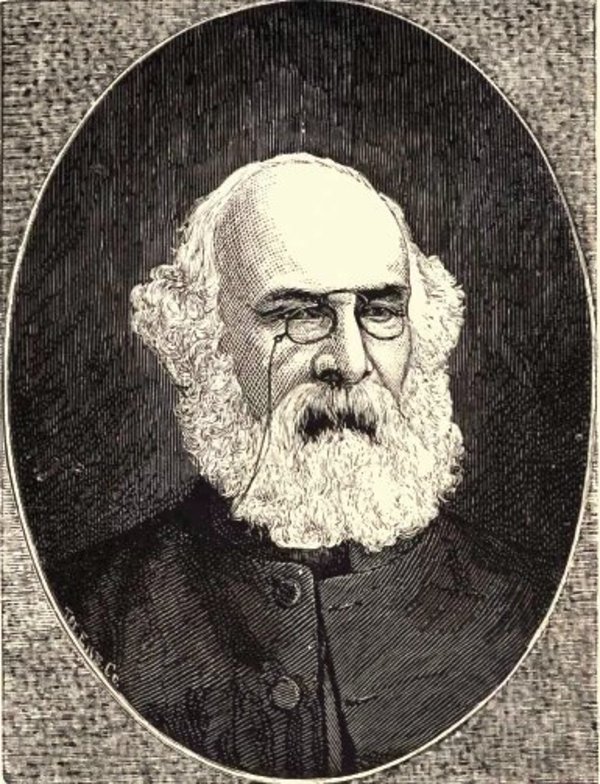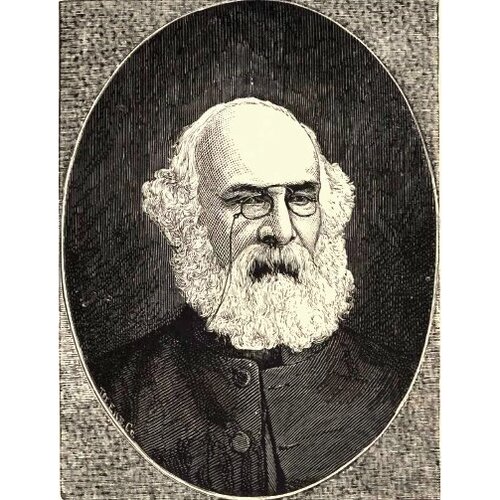
Source: Courtesy of Wikimedia Commons
WILLIAMS, JAMES WILLIAM, Church of England priest, bishop, and educator; baptized 17 Sept. 1825 in Overton, Hampshire, England, son of David Williams and Sarah Eliza —; m. 1854 Ann Maria Waldren in Huish Champflower, England, and they had two sons; d. 20 April 1892 at Quebec.
James William Williams received his early education from his father, a Church of England clergyman, and then at a grammar school in Crewkerne. In 1851 he graduated from Pembroke College, University of Oxford, in classics and mathematics. While not diminishing the value of this formal education, he later remarked that the greatest influences on him were the writings of the novelist Jonathan Swift and the philosopher Francis Bacon, which he devoured at the time “under hedges and in lone lanes” during moments of leisure. Following in his father’s footsteps, he was ordained deacon in 1852 and briefly held curacies in High Wycombe and Huish Champflower before receiving ordination as a priest in 1855. Being attracted to education, he had served as assistant master at Leamington College from 1854.
In 1857 Williams immigrated to Lower Canada upon his appointment that summer as rector of the Lennoxville grammar school, affiliated with Bishop’s College, Lennoxville. Principal Jasper Hume Nicolls* described him as “a gentleman of high standing . . . the bearer of high testimonials.” For lack of students the school had been closed for three years, and Williams began with only eight resident pupils and a few day scholars in a dilapidated house in town; within five years he was directing 128 students in a new building on the college grounds. Meanwhile, in 1860 he was appointed professor of belles-lettres at the college. He loved literature of all kinds and, according to a contemporary, “read fiction because he gained from it an idea of what was going on in modern society.”
In January 1863 the bishop of Quebec, George Jehoshaphat Mountain*, died, and in March, for the first time, the diocesan synod met to elect a successor. Asked to preach, Williams spoke impressively on the episcopal office. When the gathering divided hopelessly over the two leading candidates, he was proposed as an alternative and then elected on the 11th ballot. He was only 37. That June, on the authority of a royal licence, he was consecrated in the Cathedral of the Holy Trinity at Quebec by the metropolitan of the province of Canada, Francis Fulford*.
Williams’s diocese was enormous, extending from Trois-Rivières and the Eastern Townships to the Strait of Belle-Isle and the New Brunswick border. Because he visited it widely and frequently, he called synod biennially rather than annually as Mountain had done. Circumstances were not propitious. The English-speaking population was declining, particularly in rural parishes, and the Society for the Propagation of the Gospel, in London, was progressively withdrawing from its heavy financing of the diocese. Mountain’s government salary as bishop, which had paid several clerical stipends, had expired with him. Toward the end of Mountain’s episcopacy a plan, largely promoted by Williams, had been adopted to meet these circumstances. It set up a board to administer a diocesan endowment fund, created from the contributions of parishes and individuals, which would defray the salaries of clergymen. Since parishes and missions paid according to means, prosperous parishes in effect subsidized those that could not meet their own expenses. Under this plan, which was known nationally as the “Williams’ system” and later internationally as the “Quebec scheme,” the diocese became self-supporting during Williams’s episcopacy, 13 parishes became self-sufficient and 11 missions were created, 60 churches and 20 parsonages were built, clerical salaries were soon raised substantially and then periodically increased, a pension fund was instituted for the widows and minor children of clergymen, and $3,500 was contributed annually to foreign missions. In 1888, on the 25th anniversary of his episcopate, Williams reported having confirmed 11,196 persons, ordained 47 deacons and 43 priests, and consecrated 43 churches. These substantial advances must be measured against a modest increase in the Anglican population, which grew from 27,000 in 1865 to 30,000 by 1892.
Williams continued to be interested in education, and he took a generally democratic view of it. “There is no royal road to learning,” he wrote soon after becoming bishop, “but there is a broad highway open to all . . . who are willing to endure the heat and the dust, and to plod bravely on.” Nevertheless, he particularly urged those who would mark their generation or who coveted power to cultivate the mind as a weapon. “Use will give it edge,” he remarked. “Science will give it strength and temper. Literature will give it polish and point.” He noted that his was an age preoccupied with education, when “mills and manufactories are in full operation for the production of model masters – when inspectors and examiners are running to and fro upon the earth, and there is a general conspiracy against the ancient and honourable order of Dunces.” Both the country in a competitive world and the individual in a competitive society were required to keep “abreast of the intelligence of the day.” But more important in Williams’s estimation than education for survival was the achievement of “mental culture,” that “which enables a man to reason rather than argue,” and which could be accomplished only by “bringing our minds in contact with genius.”
Williams promoted education in all its manifestations, formal and informal, public and private, male and female, religious and secular. As bishop he was ex officio vice-principal of Bishop’s College, where, however, matters were not going well. In 1870 he contemplated closing the grammar school and regretted the “impaired efficiency” of the college itself, where enrolment averaged only 20 to 30 students a year and finances were difficult. Few showed an interest in the study of divinity, and Williams observed that prosperous families did not encourage their sons to enter the clergy. He fostered the Church of England Young Men’s Mutual Improvement Association. In 1869 he was appointed to the provincial Council of Public Instruction, and, among Protestant members, he was one of the most assiduous in attending its meetings; he was chairman of the Protestant committee of the council from 1880 to 1892. About 1875 he had been a strong advocate of a girls’ school in Compton, later known as King’s Hall, and had insisted that the education it dispensed be “as good and complete” as that available in Catholic schools.
Williams was a firm and, at times, a severe man. He personally examined confirmation candidates, and a later bishop wrote that one could “picture the trepidation of the parish priest” who had prepared them. He showed little patience for long-winded speakers at synod, and in 1879 his conduct in this respect led to high tempers, a public apology on his part, and an offer from members of the diocese to pay for a year’s leave of absence while the dust settled; he wisely accepted and with his wife visited Italy and Switzerland. In 1890 he dismissed three senior students at Bishop’s for having signed “an insolently worded petition” protesting the quality of their room and board.
Yet Williams won respect and affection. Oxford granted him an ma and a dd, and the first university building at Bishop’s paid for by the alumni was named in his honour in 1891. L’Événement of Quebec noted that “he counted intimate friends among the highest dignitaries of the Catholic clergy in this city.” In public meetings he spoke rarely and briefly but always with “force and quiet humour,” according to one contemporary. In 1888 he was described by George Maclean Rose as “an energetic and industrious ecclesiastic” and a “plain preacher.” Although he believed that “the most eloquent of sermons is a holy life,” Williams published several of his lectures and sermons. They reveal his love of the classics; in his last six sermons, preached during Lent in 1892, he urged his congregation to understand the contribution made by the Hebraic and classical world to Christianity. He died soon after. He was succeeded by Andrew Hunter Dunn, who in turn was succeeded by Williams’s son Lennox.
James William Williams is the author of A sermon preached before the synod of the diocese of Quebec, March 4th, 1863 (Quebec, 1863); A lecture on self-education (Quebec, 1865); Sermon preached before the St. George’s Society in the cathedral, 23rd April (Quebec, 1868); and A contemplation of certain events in our Saviour’s life (Montreal, 1892). A portrait of Williams is reproduced in C. H. Mockridge, The bishops of the Church of England in Canada and Newfoundland . . . (Toronto, 1896).
ANQ-Q, CE1–61, 23 avril 1892. Bishop’s College School Arch. (Lennoxville, Que.), Lennox Williams, “J. W. Quebec.” Bishop’s Univ., Arch. and Special Coll. (Lennoxville), College Council, record of meetings, 24 Nov. 1862; Corporation minutes, 30 June 1857, 26 June 1860, 1863–92. Hampshire Record Office (Winchester, Eng.), Overton, reg. of baptisms, 17 Sept. 1825. Church of England, Church Soc. of the Diocese of Quebec, Annual report, 1892; Diocese of Quebec, Journal of the synod (Quebec), 1863, 1865, 1871, 1875, 1879, 1881, 1888, 1892. Daily Colonist (Victoria), 23 April 1892. L’Événement, 21 avril 1892. Morning Chronicle (Quebec), 30 June 1888. Stanstead Journal (Rock Island, Que.), 12 May 1892. Cyclopædia of Canadian biog. (Rose and Charlesworth). L.-P. Audet, Histoire du conseil de l’Instruction publique de la province de Québec, 1856–1964 (Montréal, 1964). Philip Carrington, The Anglican Church in Canada; a history (Toronto, 1963). D. C. Masters, Bishop’s University, the first hundred years (Toronto, 1950). W. P. Percival, Across the years: a century of education in the province of Quebec (Montreal, 1946), 151. O. R. Rowley et al., The Anglican episcopate of Canada and Newfoundland (2v., Milwaukee, Wis., and Toronto, 1928–61), 1. R. H. Waterman, “James William Williams,” Quebec Diocesan Gazette (Quebec), 87 (1975): 3–5.
Cite This Article
Robin B. Burns, “WILLIAMS, JAMES WILLIAM,” in Dictionary of Canadian Biography, vol. 12, University of Toronto/Université Laval, 2003–, accessed February 19, 2026, https://www.biographi.ca/en/bio/williams_james_william_12E.html.
The citation above shows the format for footnotes and endnotes according to the Chicago manual of style (16th edition). Information to be used in other citation formats:
| Permalink: | https://www.biographi.ca/en/bio/williams_james_william_12E.html |
| Author of Article: | Robin B. Burns |
| Title of Article: | WILLIAMS, JAMES WILLIAM |
| Publication Name: | Dictionary of Canadian Biography, vol. 12 |
| Publisher: | University of Toronto/Université Laval |
| Year of publication: | 1990 |
| Year of revision: | 1990 |
| Access Date: | February 19, 2026 |



